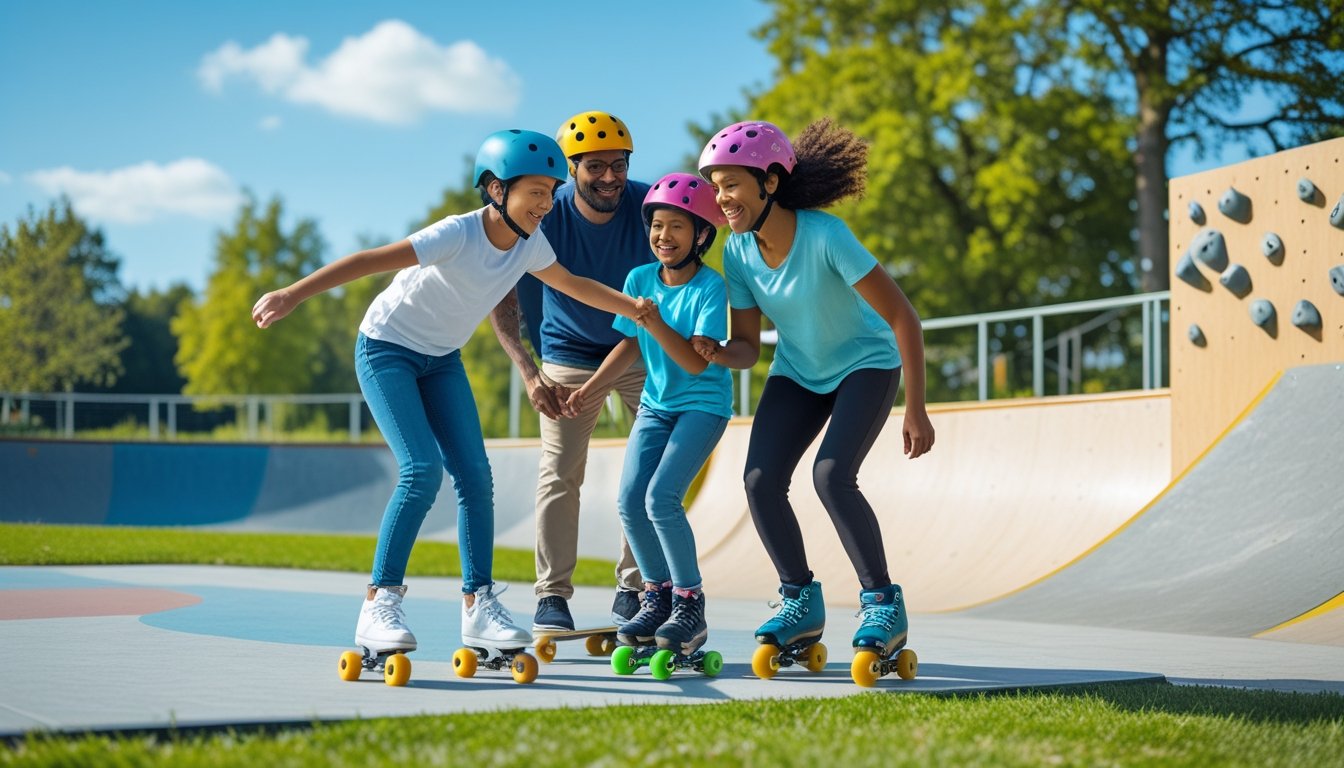Late updated: 24 May 2025 12:05
Written by: Emma Saunders
Alternative Sports for Family Bonding: Innovative Activities to Strengthen Connections
Family activities are essential for building strong bonds, and what better way to achieve this than through alternative sports? Traditional sports can sometimes be competitive, which may not suit every family. Instead, engaging in alternative sports offers a unique opportunity to bond while learning new skills and having fun together. By exploring activities like orienteering, archery, and horseback riding, families can nurture a strong connection and create lasting memories.

These alternative sports are not only enjoyable but also inclusive, allowing participation from all family members regardless of their ability levels. Whether it’s a weekend of exploring nature through orienteering or the thrill of archery, these activities cater to diverse interests and promote teamwork and communication.
For families seeking inclusive and enjoyable options beyond the traditional sports realm, alternative sports not only foster physical activity but also the value of collaboration and mutual support. Let's explore how these unique activities can transform family time into something extraordinary.
Key Takeaways
- We explore alternative sports that enhance family bonds.
- Inclusive options like archery and orienteering offer unique family fun.
- Alternative sports encourage collaboration and lasting memories.
The Benefits of Alternative Sports for Family Bonding

Alternative sports offer unique opportunities for families to strengthen bonds, improve communication, and foster inclusivity. Engaging in these activities together enhances emotional well-being and provides a supportive environment for individuals of all abilities, including those with autism.
Improving Communication and Teamwork
Participating in alternative sports provides families with a platform to develop better communication and teamwork. Whether it's coordinating movements in a dance routine or strategising during a friendly game of ultimate frisbee, these activities require us to listen and respond to each other effectively.
As we navigate the dynamics of these sports, we learn to trust one another and anticipate each other's actions. This shared experience can deepen our understanding and cooperation outside the sporting context, fostering a sense of unity and collaboration that benefits our relationships.
Enhancing Emotional Well-Being
Involvement in these sports can significantly enhance the emotional well-being of both children and parents. Engaging in physical activities releases endorphins which boost our mood and reduce stress levels. When we engage with each other in a fun and relaxed setting, it promotes joy and connection.
For families, particularly those with children on the autism spectrum, alternative sports provide a safe space to express emotions and build self-confidence. The focus is on personal growth and enjoyment rather than competition, allowing everyone to flourish at their own pace.
Fostering Inclusivity for All Abilities
An important advantage of alternative sports is their inherent inclusivity. Many of these activities can be tailored to accommodate various skill levels and physical abilities, making them accessible to all family members. Adaptive equipment and modified rules can ensure that everyone, regardless of their abilities, can participate fully.
This inclusivity is particularly beneficial for families with members who have autism or other disabilities. It creates an environment where everyone feels valued and part of the team, encouraging empathy and understanding. Inclusive sports not only strengthen our family bonds but also teach acceptance and appreciation for diversity.
Top Alternative Sports for Inclusive Family Activities
Alternative sports provide opportunities for families to bond by engaging in less conventional physical activities. These sports offer inclusivity for all family members, empowering everyone to participate regardless of their abilities or preferences.
Popular Outdoor Sports to Try
Families can explore a variety of outdoor sports that are both enjoyable and accessible. Cycling is a great way for families to exercise together, offering flexibility in terms of duration and intensity. Rock climbing provides an exhilarating challenge, enhancing physical and mental agility while fostering teamwork as family members support each other.
For those interested in precision and concentration, archery offers a unique experience. Setting up a safe practice range in the garden encourages family participation. These activities can be adapted to various skill levels, ensuring inclusivity for all family members.
Indoor Activities for All Weather
Indoor sports provide a means to stay active regardless of weather conditions. Martial arts such as tae kwon do or karate can be practiced at home or in a local gym, helping families to improve fitness and focus. These activities are perfect for developing discipline and confidence in a supportive environment.
Bowling at home is another fun, accessible indoor sport. A simple setup in a hallway can provide endless fun, making it suitable for family members with diverse abilities. Fencing can also be an exciting option, encouraging strategy and coordination. These indoor activities offer a safe space for all family members to engage in sport.
Adapting Sports for Diverse Needs
Inclusivity means making sports adaptable for everyone, and some activities can be specifically tailored. Parkour can be adapted to suit different ability levels, offering a creative way to navigate obstacles and improve agility. Gymnastics provides opportunities for families to enjoy movement through customisable routines.
For families with members with autism, games like volleyball played with softer balls can enhance social skills and cooperative play. Similarly, boccia is a sport designed to include participants with physical disabilities, allowing everyone to engage in strategic play. By adapting these sports, we ensure that every family member can participate and enjoy the benefits of physical activity together.
Frequently Asked Questions

Our focus is on alternative sports that families can enjoy together. These activities encourage bonding, cater to different interests and energy levels, and can be adapted to various environments.
What are some engaging family activities that promote togetherness and can be enjoyed outdoors?
Many families find hiking and cycling to be fulfilling activities that allow everyone to appreciate nature. Exploring local trails or countryside paths can be both invigorating and calming. Outdoor yoga sessions in the garden or park also offer a tranquil way to connect with each other.
How can families stay active together with sports that are suitable for indoor settings?
Table tennis and badminton are excellent sports that can be played indoors. They not only provide good exercise but also improve hand-eye coordination. For younger family members, an indoor obstacle course using household items can make for a fun and creative session.
Can you list some non-competitive activities that are suitable for children and help nurture family bonds?
Nature scavenger hunts and birdwatching involve collaboration, not competition. These activities encourage children to learn about their environment while working together. Gardening as a family can also be a rewarding way to spend quality time together and teach patience.
What are effective ways to encourage physical activity for children who show little interest in conventional sports?
For those not enthusiastic about traditional sports, exploring dance or martial arts can be both engaging and beneficial. These activities often have a rhythmic element that excites children and keeps them motivated. Crafting a playful atmosphere helps spark interest and participation.
What are the best sports to consider for children who have a lot of energy and need to stay active?
Energetic children may thrive in sports like swimming or athletics, which allow them to channel their high energy levels. Activities such as climbing or trampolining are also excellent options, providing both excitement and a positive way to expend energy.
What are some inventive family exercise ideas that can be easily incorporated into a home environment?
Implementing family dance parties or yoga sessions is a creative way to bring exercise into the home. Engaging in short workout challenges together, such as sit-up or push-up contests, adds a competitive yet friendly edge. Active video games can also keep the family moving.
